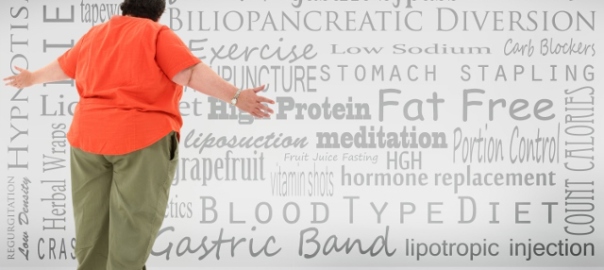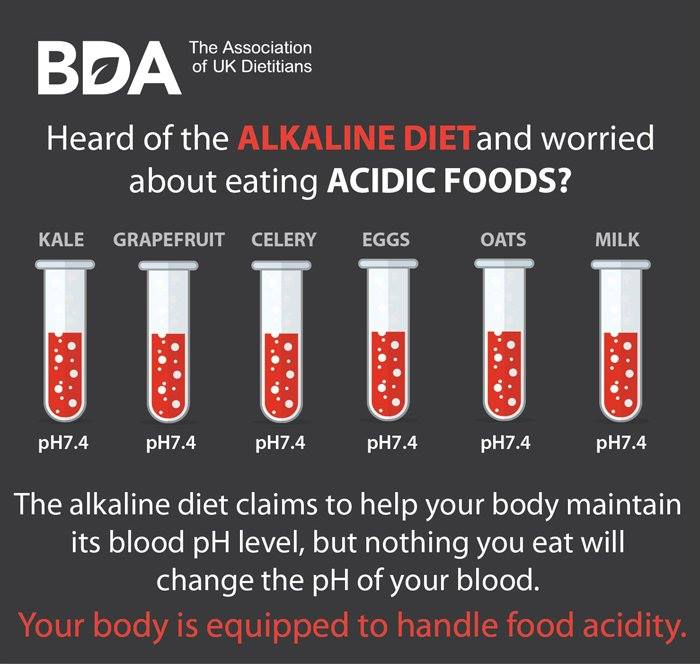Are you curious about a certain diet? Do you want to give advice to a friend who’s following an eating plan that doesn’t make a lot of sense to you? The authors of many diet books spin a fine tale with plenty of anecdotes that sound very convincing.
But keep in mind. . . the plural of anecdotes is not data. Many of these books lack solid scientific evidence to support their claims.
Or, even more confusing, they seem to be scientifically based, but authors are citing only the research that supports their ideas to create a stronger case for their eating plan, while ignoring the research that doesn’t. This makes it challenging to find evidence-based and unbiased reviews.
But people lose weight on these diets!
- People initially lose weight on all kinds of diets (healthy and unhealthy, scientifically sound and unsound). This is often because they have decided to change their behavior, and are paying more attention to what they are eating, two important steps for behavior change that often lead to eating fewer calories.
- Most people regain the weight they have lost after the initial motivation wears off, because they couldn’t maintain the changes.
A critical aspect of successful behavior change is learning to develop habits you can maintain for life.
Be wary of books that . . .
- Claim “everything you’ve been told about nutrition is wrong’
- Blame a certain food group or food component (for example, carbohydrates, grains, gluten) as responsible for a long list of ailments
- Make outrageous claims of success
- Use many personal stories and testimonials; although these are compelling, they are not evidence
More Reading>> How to Create a Fad Diet
Beyond weight loss
Weight loss isn’t everything – the foods we eat are critical to good health so you’ll want to adopt an eating plan that promotes good health and prevents disease.
For general guidelines on eating for health and weight loss, check out this page.
GUIDE
In this space, I will be providing a brief overview of popular diets and link to reputable articles, thorough reviews, and research updates that do a good job looking at the benefits and evidence behind these eating plans. As time allows, I’ll provide my own reviews.
Recommended Approaches
- DASH Diet
- Diet Fix
- FU Diet
- Mediterranean
- Mindful Eating
- New Nordic Diet
- OmniHeart Diet
- Slim by Design
- Spark Solution Diet
- Therapeutic Lifestyle Changes
- Volumetrics
Advice You Should Question (Evidence Varies)
Diets in this category have some or many health-promoting features (i.e., they might recommend more vegetables, restrict highly processed foods, limit sugar) and promote initial weight loss through calorie restriction. But generally, I would not recommend most of them, especially the ones that restrict certain foods without good enough scientific evidence, boast “miracle” results, rapid weight loss, cherry pick the research, demonize a food group (evil and magic foods), or have a conspiracy focus (and some of the books below do all of this!).
- Alkaline Diet
- Always Hungry
- Blood Type Diets
- Gluten-Free
- Intermittent Fasting
- Low Carb/High Fat (LCHF) Diets
- Low Carb Diets for Athletes
- Paleo
- Pioppi Diet
- Raw Food Diet
- Stash Plan
- Anti-Grain (Wheat Belly, Grain Brain)
Stay away from the diets or approaches in this section. All of them use pseudoscience to sell their ideas, and some of them verge on the more “extreme” side of energy restriction. Herbalife, Shakeology and Isagenix plans are multi-level marketing schemes that deceive consumers by making them believe that they need to buy their products for good health/weight loss.
- Cook Your Butt Off (Rocco DiSpirito)
- Detox or Cleansing Diets
- Herbalife
- Isagenix
- Shakeology
- Whole30
What’s the “Best” Diet?
Trick question! There is no best diet for weight loss. Your previous diet, activity level, motivation, environment and many other variables factor into what will work for you.
- Surprisingly simple tips from 20 experts about how to lose weight and keep it off (Julia Beluz, Vox.com)
- Science Compared Every Diet, and the Winner Is Real Food (The Atlantic)
- Can we say what diet is best for health? (Ann Rev Public Health, March 2014)
- Why diet news can be confusing (David L. Katz, MD, MPH)
- Best Diets: US News & World Report Rankings – Excellent and thorough reviews by a reputable panel of experts
- Confused about information saying you need to avoid all dairy, sugar, & wheat for health? (Jill Parnell, PhD)
- 10 easy ways to spot a fad diet (Tim Crowe, Thinking Nutrition Blog)
Recommended Approaches
in alphabetical order. . .
DASH Diet
Overview: The DASH (Dietary Approaches to Stop Hypertension) was developed originally as a research diet to study the influence of this eating plan on hypertension and other cardiovascular risk factors. Rigorous studies have shown the DASH diet can lower blood pressure, reducing your risk of heart disease and stroke, increase “good” HDL cholesterol and decrease “bad” LDL cholesterol.
The DASH eating plan
- encourages plenty of vegetables, fruits, lean protein, and low-fat dairy
- focuses on whole grains and beans
- limits saturated fat, cholesterol, and total fat
- limits sodium, sweets, added sugars and sugary beverages, and red meats
Reviews & More Information:
- DASH Eating Plan (free download from the National Institutes of Health)
- DASH Diet Review (US News and World Report)
- Effects of the DASH Diet Alone and in Combination With Exercise and Weight Loss on Blood Pressure and Cardiovascular Biomarkers (Archives of internal medicine 2010;170(2):126-135. doi:10.1001/archinternmed.2009.470).
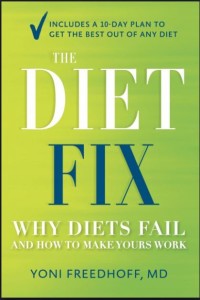 The Diet Fix
The Diet Fix
Overview: Dr. Yoni Freedhoff, medical director at Ottawa’s Bariatric Medical Institute lets you know that there are no quick fixes for losing weight, and focuses his book on helping you develop the skills you need to help support permanent behavior change. The book is practical, showcases Freedhoff’s vast-experience as a weight-loss specialist, and is routed in evidence-based behavior change and weight loss strategies. His experience echoes research findings showing that the most successful diets are ones you can stick to, so he helps you lay out a plan that you can live with.
Reviews & More Information:
- Diet books you can trust? Gimmick-free? Yes, it’s possible (Jennifer Sygo, National Post)
- Science Based Medicine Review
- Book Review: The Diet Fix–Why Diets Fail and How to Make Yours Work (Patrick Mustain, Scientific American)
FU Diet
Overview: This is not an eating style or diet book, but the excellent web resource of clinical psychologist and weight loss expert Sherry Pagoto. Sherry believes that achieving health is about living a healthy life, not about dieting or magic pills, and her website embodies that spirit. Her many articles are evidence-based, and will help you stay healthy and control your weight using the latest science on appetite, exercise, and health.

More Information:
Mediterranean
 Overview: A Mediterranean diet typically focuses on plant-based foods like vegetables, fruits, and whole grains; healthy fats from nuts, seeds, and olive oil; moderate intake of fish and poultry, and low intake of dairy products, red meat, processed meats, and sweets. This eating plan can include many delicious foods, is not restrictive, and there is an extensive and growing body of research linking eating “Mediterranean-style” to numerous health benefits.
Overview: A Mediterranean diet typically focuses on plant-based foods like vegetables, fruits, and whole grains; healthy fats from nuts, seeds, and olive oil; moderate intake of fish and poultry, and low intake of dairy products, red meat, processed meats, and sweets. This eating plan can include many delicious foods, is not restrictive, and there is an extensive and growing body of research linking eating “Mediterranean-style” to numerous health benefits.
Reviews & More Information:
- More good news for the Mediterranean diet. A new study shows that this eating pattern lower 2 markers of inflammation (platelets and white blood cells) tied to heart attack and stroke. (Blood, journal of the American Society of Hematology)
- Strong association between Mediterranean diet and lower risk of diabetes (American College of Cardiology’s 63rd Annual Scientific Session)
- Adopt a Mediterranean diet now for better health later
- The Mediterranean diet: the world’s healthiest diet?
- New study adds to many benefits of Mediterranean diet: reduced risk of peripheral artery disease
Mindful Eating
 Overview. Mindful eating is not a diet, but a practice that changes the way you think about food. Eating mindfully means giving full attention to the food that you’re eating and recognizing your feelings of hunger and fullness. This practice should help you identify triggers to mindless eating and help you the value quality over quantity of what you’re eating. A growing body of research is showing that this approach to eating can improve obesity-related eating behaviours such as binge eating and emotional eating. Proponents of mindful eating for weight loss highlight research supporting the idea that structured dieting often doesn’t work for weight loss and long-term weight maintenance.
Overview. Mindful eating is not a diet, but a practice that changes the way you think about food. Eating mindfully means giving full attention to the food that you’re eating and recognizing your feelings of hunger and fullness. This practice should help you identify triggers to mindless eating and help you the value quality over quantity of what you’re eating. A growing body of research is showing that this approach to eating can improve obesity-related eating behaviours such as binge eating and emotional eating. Proponents of mindful eating for weight loss highlight research supporting the idea that structured dieting often doesn’t work for weight loss and long-term weight maintenance.
Reviews & More Information:
- The Principles of Mindful Eating
- Mindful Eating Resources (The Center for Mindful Eating)
- Savor: Mindful Eating, Mindful Life (by Thich Nhat Hanh and Lilian Cheung)
Research
- The Effect of a Mindful Restaurant Eating Intervention on Weight Management in Women (J Nutr Educ Behav. Jan 2012; 44(1): 22–28). A “Mindful Restaurant Eating” intervention helped prevent weight gain and reduced daily caloric and fat intake.
- Comparative effectiveness of a mindful eating intervention to a diabetes self-management intervention among adults with type 2 diabetes: a pilot study. (J Acad Nutr Diet. Nov 2012; 112(11): 1835–1842.)Training in mindful eating and diabetes self-management helped improve dietary intake, weight loss, and glycemic control.
New Nordic Diet
Overview: Researchers from the University of Copenhagen developed this eating plan, which is similar to the Mediterranean diet. The diet focuses on vegetables and fruits, protein from lean meats and seafood, and locally-grown, organic, and in-season eating. The diet isn’t about deprivation or drastic changes, but focusing on healthful foods.
Reviews & More Information:
- Report: Basis for the New Nordic Diet (University of Copenhagen)
- Nordic Diet Could Be Local Alternative To Mediterranean Diet
- Does the New Nordic Diet Help You Lose Weight?
- Learn all about the New Nordic Diet! (free online course -Coursera – with University of Copenhegan
- The Nordic diet: Healthy eating with an eco-friendly bent (Harvard Health Blog)
OmniHeart Diets
The OmniHeart Diet is based on a clinical trial looking at variations of the DASH diet. Like DASH, the diets were rich in fruits, vegetables, whole grains, fish, nuts, seeds and legumes. Diets were also low in sweets, added sugars and red meats. Researchers found that replacing some carbohydrate-containing foods with lean proteins or unsaturated fats had greater cholesterol-reducing and blood-pressure reducing benefits. (OMNI stands for Optimal Macro Nutrient Intake – hence the protein/carb/fat differences).
More Information:
- The OmniHeart Diet: A day’s worth of food (Nutrition Action)
- The effects of carbohydrate, unsaturated fat, and protein intake on measures of insulin sensitivity: results from the OmniHeart trial (Diabetes Care. 2013 May;36(5):1132-7.)
Slim by Design
This book is by Brian Wansink is a researcher who is passionate about figuring out how cues that aren’t related to hunger influence our eating habits. Slim by Design: Mindless Eating Solutions for Everyday Life shows you how to rearrange your environment so it’s conducive to good habits and healthy eating. This book follows the principles of Wansink’s Mindless Eating. I’ve written more about Brian Wansink’s research here.
- How to eat for health – willpower not required (LA Times)
- Marion Nestle Review
- Yoni Freedhoff Review
Spark Solution Diet
Overview: Brought to you by the popular healthy living website sparkpeople.com, the general guidelines in this book are well-founded in successful weight loss and behavior change: balanced meals, calorie reduction and exercise. For those whole like a lot of detail for food choices, the book outlines 2 weeks of structured meal plans.
Reviews & More Information:
- Spark Solution Diet Review (US News & World Report)
Therapeutic Lifestyle Changes Diet (TLC)
Overview: This diet is a heart-healthy plan aiming to reduce the risk of cardiovascular disease with a focus on lowering cholesterol. It was created by the National Institutes of Health’s National Cholesterol Education Program.
Reviews & More Information:
- TLC Diet Review (US News & World Report)
- TLC Diet Guidelines (free download from National Institutes of Health and National Heart, Lung, and Blood Institute)
Volumetrics
Overview: Despite the faddish name, this eating plan is routed in sound science. The diet plan focuses on choosing healthful foods that fill you up with fewer calories, based on the research of Barbara Rolls.
- Volumetrics (Web MD Review)
- Volumetrics review (US News & World Report)
Advice You Should Question
(Evidence Varies)
You can eat well on some of the diets below, and you may lose weight. Many feature some good nutritional wisdom, such as eating more fruits and vegetables, and fewer refined grains, sugar, and processed foods. Others heavily restrict some foods (e.g. carb-containing foods). The reason they are on my “Questionable” list is because the evidence behind some of the recommendations is not rigorous.
Alkaline Diet
Overview: The alkaline diet is based on the idea that some foods (meat, wheat, refined sugar, and processed foods) cause your body to produce acid, which isn’t good for your health. The diet encourages foods that make your body more alkaline to protect from disease and help you lose weight.
Problems with the alkaline diet: Although many “alkaline” foods like vegetables and fruits are health promoting, how what you eat influences your body’s acidity level (PH) is not fully understood. The environment in which foods are digested is complex, and many scientists question the accuracy of methods used to calculate the acidity of foods. Foods avoided may limit your intake of essential nutrients such as calcium, iron and zinc. Some nutritious on the acidic list include oats, blueberries, cranberries, most legumes (lentils and beans), many nuts, corn, olives, mushrooms, and many grains.
This infographic from the Association of UK Dietitians sums up the lack of logic with the alkaline diet . . .
Reviews & More Information:
- 4 Half-Truths about the Acid-Base Balance and the Alkaline Diet (Olivier Bernard, the Pharmafist)
- Alkaline diet review
- The alkaline diet – is it supported by science?
- The alkaline diet – fact or fad? (Deakin Nutrition)
- The alkaline diet: is there evidence that an alkaline pH diet benefits health? (J Env Public Health)
- Does a PH balancing diet work? (Monica Reinagel, M.S.,L.D./N)
- (Diet Review) The Alkaline Diet – A Mockery Of Basic Physiology (Abby Langer, RD)
Always Hungry
This diet book by researcher Dr. David Ludwig boasts that it will help you “conquer cravings, retrain your fat cells and lose weight permanently.” This is book is based on the questionable claim that carbohydrates make you fat because of their influence on insulin (see low-carb diets below). Ludwig says our belief that calories in, calories out has actually contributed to weight gain. This is simply not true and a misrepresentation of the data.
- Always Hungry? It’s Probably Not Your Insulin. (Stephan Guyenet)
- Diet books are full of lies. But they’re even worse when doctors write them. (Julia Beluz, Vox.com)
Blood Type Diets
Overview: The blood type diet recommends eating based on your blood type — O, A, B, or AB — to help you lose weight, have more energy, and prevent disease. The idea is that you will digest foods more efficiently if you eat foods designed for your blood type (the author claims that the foods you eat react chemically with your blood).
“Eat Right 4 Your Type: The Individualized Blood Type Diet Solution” written by Peter D’Adamo is a very popular blood type diet book. Adamo’s website will try to sell you a complete line of expensive weight loss supplements customized for your blood type (when you see diet book authors selling supplements, it’s safe to say you can ignore their advice – and save your money).
Problems with the Blood Type Diet. The blood type diet did undergo scientific investigation, but researchers found any health improvements were not linked to blood type. The excellent resource Red Pen Reviews could not find good evidence to support the dietary claims in Eat Rigth 4 Your Type.
- Eat Right 4 Your Type Review (Red Pen Reviews)
- Blood Type Diets Debunked (Science Daily)
- Blood type diets lack supporting evidence (American Journal of Clinical Nutrition)
Gluten-Free

Overview: Gluten is a protein found in wheat, rye, and barley. The 1 percent of North Americans have celiac disease need to strictly avoid gluten, and the 6-7% of individuals who are sensitive to gluten may feel better on a gluten-free diet. Others will benefit if it means they start paying attention to what they’re eating, eat more vegetables and fruits, and avoid processed foods; but the health benefits for these people aren’t likely because they are avoiding gluten.
Problems with Gluten-Free Diets: Gluten-free diet proponents claim that gluten makes you sick, causes inflammation, gives you headaches, is a toxin, creates digestive problems, increases insulin resistance, and leads to weight gain. These claims aren’t supported by science, and the idea that gluten sensitivity is widespread goes far beyond the current scientific evidence.
Reviews & More Information:
-
- The Gluten-Free Diet: Recognizing Fact, Fiction, and Fad (Journal of Pediatrics, In Press May 2016)
- Gluten sensitivity: new epidemic or new myth? (Nash DT, Slutzky AR. Baylor University. Medical Center; 2014;27(4):377-378.)
- Athletes avoiding gluten or grains – is there good evidence? (Sheila Kealey)
- Hidden risks of going gluten free for health (Consumer Reports)
- Experts Question Benefits of Gluten-Free for All but a Small Minority (Wall Street Journal)
- Eat More Gluten: The Diet Fad Must Die (Jeffrey Kluger, Time Magazine)
-
Gluten elimination diets: Facts for patients on this food fad (Kathleen Cadenhead, MD, Margo Sweeny, MD, BC Medical Journal)
-
Dissecting the Myth: Why Grains and Gluten Aren’t Bad for You
- Is gluten-free healthier? (Jill Parnell, PHD)
- The dangers of going gluten free
- Gluten-free diets: who’s spreading the bulldust? (Bill Shrapnel, MHP)
- The facts about gluten and gluten intolerance. (Science-Based Medicine)
- Non-Celiac Gluten Sensitivity (Steven Novella, Neurologica Blog)
- When a gluten-free diet is *bad* for you (Berkeley Wellness, UC California Berkeley)
- Is gluten-free healthier? (Jill Parnell, PhD, Mount Royal University)
- The dangers of going gluten free (Maclean’s Magazine)
- Gluten & MSG intolerance may be only in your head. That’s nothing to be ashamed of (Slate Magazine)
- Gluten-free diets: who’s spreading the bulldust? (Bill Shrapnel, Skeptical Nutritionist Blog)
- The facts about gluten and gluten intolerance. (Science-Based Medicine blog)
Gluten Can be Good for You
Although the anti-gluten books claim the gluten is the cause of almost all health problems, gluten (for non-celiacs) can actually be health promoting (the information and links below are from Dr Mirkin.com – an excellent evidence-based nutrition and health resource)
- Gluten helps to lower high triglycerides, a blood fat that can increase risk for diabetes and heart attacks (J Am Coll Nutr 1999; 18:159–165).
- Gluten increases growth of good bacteria in your intestines (Brit J Nutr, 2008;99:110–120) that reduce inflammation and increase absorption of healthful nutrients (Curr Opin Clin Nutr Metab Care, 2010;13:722–728).
- Gluten makes your cells more sensitive to insulin, helping to prevent or treat diabetes (Curr Diab Rep, 2011;11:154–159).
- Gluten may reduce heart attack risk (Curr Atheroscler Rep, 2010;12:368–376), and lower high blood pressure (Food Chem, 2011;127:1653–1658).
Intermittent Fasting/Time Restricted Eating
Overview: Many variations of intermittent fasting diets exist, but they generally involve consuming no calories or severely restricting calorie intake for defined periods. Proponents claim intermittent fasting can improve overall health, help with weight loss, improve body composition, improve insulin sensitivity, reduce systemic inflammation, and increase your lifespan.
Problems with intermittent fasting. Intermittent fasting regimes have been studied in animals, and do show health benefits. Human studies are fewer and only short term, and although some fasting regimes have shown health improvements (e.g., lowered blood pressure, improved insulin sensitivity, lower markers of inflammation) rigorous research in this area is lacking, and no long-term studies in humans have been conducted. Adhering to such a plan would be difficult for most individuals (you might not be the best dinner party guest), data for physically active individuals is lacking, and could create unhealthy relationships with food.
If you are an athlete, will intermittent fasting improve your health and performance? Sports nutrition experts don’t think so, and the health and injury risks of inadequate energy availability for athletes overall or even for strenuous workout sessions is a growing concern.
However, recent preliminary research suggests that simply prolonging the nightly fast might be a feasible and easy way for individuals to restrict their feeding window and benefit metabolic health, although again, more studies are needed to confirm findings and make evidence-based recommendations. The study below investigates how circadian rhythms and timing of food influences metabolic health.
Novel research method to study eating habits and time restricted eating. An emerging field of research is looking into how the timing of meals in relation to our circadian rhythms (which influence biological processes and metabolism) affects health. Researchers from the Salk Institute are investigating what they call “metabolic jet lag,” a name they use to describe when circadian rhythms become distorted due to irregular eating times.
Early findings in animals and preliminary small studies in humans suggest it might be better for health to restrict our feeding period. The Salk investigators developed an app to get a snapshot of timing of eating patterns, and used the app to help study participants limit their feeding to a 10-11 hour period. After 16 weeks, participants with a restricted feeding window lost weight and reported better sleep and energy levels. You can download the smartphone app (and contribute your data to their research) here. (Cell Metabolism, September, 2015).
Reviews & More Information:
- Is intermittent fasting healthy? The science behind the fad (Hannah Ellerton, Human Kinetics)
- New Intermittent Fasting Study: No Magic Weight Loss Benefits Hungry Making (review of the 5 2 FAST Diet for Beginners). (Weighty Matters Blog by Yoni Freedhoff)
- Could intermittent fasting diets increase diabetes risk?
- Metabolic Effects of Intermittent Fasting (Patterson et al. Annual Review of Nutrition 2017)
- Weight-loss by the Clock? (Jill Parnell, No Baloney Blog)
- Time-restricted feeding and risk of metabolic disease: a review of human and animal studies. (Nutrition Reviews, April 2014)
- Are there benefits of intermittent fasting? A look at what some studies have found. (Nutrition Action)
- Intermittent Fasting: Skip Meals, Lose Weight? (Kristin Weins, No Baloney Blog)
- What are the health benefits of fasting? (Monica Reinagel, M.S.,L.D./N)
- Diet Book Review: The Fast Diet (Weighty Matters Blog by Yoni Freedhoff)
Low Carb/High Fat (LCHF) or Ketogenic Diets
Some people successfully lose weight by restricting their carbohydrates. One problem with the “low carb” craze is lumping all carbohydrates into one category, equating legumes to candy. These diets often claim that guidelines to increase carbohydrates made people fat, because people decreased their fat intake and increased carbohydrate intake, although there is no good evidence to support this claim.
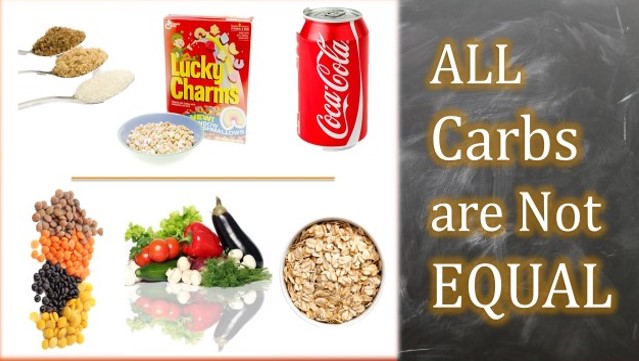 Data show that an increase in calories better explains the obesity epidemic than recommendations to reduce fat intake (and contrary to popular belief, Americans did not reduce their fat intake, but they did increase their calorie intake). Proponents of low carb diets claim that nutrition scientists are deceptive, and have been ignoring any research supporting high fat diets. Although this makes for a good story, this is simply not true.
Data show that an increase in calories better explains the obesity epidemic than recommendations to reduce fat intake (and contrary to popular belief, Americans did not reduce their fat intake, but they did increase their calorie intake). Proponents of low carb diets claim that nutrition scientists are deceptive, and have been ignoring any research supporting high fat diets. Although this makes for a good story, this is simply not true.
These diets often recommend consuming high amounts of fats and saturated fats. Although research on fats is evolving, no evidence shows that diets high in saturated fats are healthy, and quite a bit of evidence suggests they promote disease.
If you want to reduce your carbohydrate intake, limit refined carbohydrates (sugars, processed foods), but keep the healthy beans/legumes, vegetables, and fruits, and unprocessed whole grains that are important for good health.
- The ketogenic diet is no cure for cancer, despite what the cranks say (Alastair McAlpine, MedicalBrief)
- Banting Diet: Prof Tim Noakes might be a scientist, but the Banting Diet is based on bad scientific reasoning (Carine Visagie, Health24)
- Is it time to stop blaming insulin for “fat storage”? (David Despain)
- Banting Diet -Tim Noakes
- The Carbohydrate Hypothesis of Obesity: a Critical Examination (Stephan Guyenet, PhD)
- Low Carbohydrate versus Isoenergetic Balanced Diets for Reducing Weight and Cardiovascular Risk: A Systematic Review and Meta-Analysis (PLoS ONE, July 2014: 9(7): e100652. doi:10.1371/journal.pone.0100652)
- Saturated Fat Working Group: Cross-cutting Topics of Dietary Guidance and Public Health Importance (Dietary Guidelines 2015 Working Group)
- Butter vs Margarine: Evidence refuting butter-is-healthy claims. (Reijo Laatikainen)
- THE BIG FAT SURPRISE: A CRITICAL REVIEW Part 1; Part 2
- War of the Worlds: Butter vs Oil (Nutrevolve)
- Carbs, SFAs, and Circulating Fatty Acids (Nutrevolve)
- Dietary fat and heart disease study is seriously misleading (Harvard Nutrition Source)
- Saturated Fat: Friend or Foe? (Fooducate.com)
Low Carb Diets for Athletes
Athletes need more carbohydrates that most people to fuel their physical activity. Low-carbohydrate diets can leave endurance athletes short on fuel for their workouts, compromise recovery, and suppress their immune system. Most wheat-free/grain free/gluten-free diets are low carb diets.
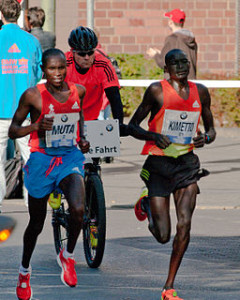
Some athletes are confused by some interesting research looking at carbohydrate restriction in athletes. Although proponents of the research claim improved performance benefits, to date but no study has shown performance benefits and there are risks. Low-carb training **might** be effective periodically, but not as an everyday diet for athletes. For example, low carb/fasted “low glycogen” workouts can be used as a training strategy (the Canadian marathoners did this – a kind of nutrition periodization). The research on the benefits isn’t solid, and experts recommend being careful about when/how you implement these workouts (best during baseline training/not high intensity). Here’s an excellent interview about low-carbohydrate training with the leading sports nutrition expert in the field of carbohydrate metabolism.
An evidence-based approach to manipulating carbohydrate intake for performance would be for athletes to periodize carbohydrate level with activity level (i.e., eat more carbs when you are more active, fewer carbs when you are less active; incorporate carefully-planned low carb workouts).
Reviews & More Information:
- Can a low carb diet help or hinder your performance? (Anita Bean)
- Low-carbing for endurance: the oxygen problem (Examine.com)
- Ketogenic diets for athletes (Asker Jeukendrup, mysportscience.com)
- Low-Carbohydrate Diets for Athletes (video – NSCA’s 2013 Personal Trainer Conference, Alan Aragon and Jeff Volek).
- A low-carb diet can hurt your training without you even realizing it. Nice review of Australian study looking at glycogen (Matt Fitzgerald)
- Higher carbohydrate intake reduces overtraining symptoms (Asker Jeukendrup, mysportscience.com)
- Carbs Are Not the Enemy: Oversimplification Is (John Berardi, PhD)
- Why carbohydrates are critical for top performance in athletes (Iñigo San Millán, PhD)
- Carbohydrate needs of athletes (AIS Fact Sheet)
- Are Ketogenic Diets Effective for Athletes? (Jill Parnell, No Baloney)
- Athletes avoiding gluten or grains – is there good evidence? (Sheila Kealey)
- Carbohydrate supplementation during exercise: Does it help? How much is too much? (Asker Jeukendrup, PhD, FACSM)
- The truth about low-carb diets for athletes (Outside Magazine)
- Is there any evidence to support low carb diets for physical performance or weight loss? (Jill Parnell, PhD, No Baloney)
- Carb controversy: why low-carb diets have got it all wrong (Brian St Pierre, Precision Nutrition)
- Athletes Staying Away From Carbs: Really? (Nancy Clarke, RD)
Paleo Diet
Overview: The basic principal of the Paleo diet is to adopt the eating habits of our ancestors in the paleolithic period (between 2.5 million and 10,000 year ago) who were picking berries, hunting and scavenging meat and fish, or digging for tubers. Paleo is based on the idea that no species should eat something it hasn’t eaten before, because it can’t adapt. The diet focuses on meat, vegetables, and fruits, and excludes dairy, grains, legumes (peanuts, lentils, beans, peas), alcohol, and sugars.
Problems with Paleo: The paleo diet has been widely criticized by evolutionary biologists and nutrition experts. Although the paleo diet can be a healthy one, it excludes many health-promoting foods for reasons that aren’t well-supported by science. Also, many paleo dieters eat large quantities of red meat, which is at odds with evidence-based disease prevention recommendations.
Reviews & More Information:
- From the standpoint of paleoecology, the so-called Paleo diet is a myth (Scientific American)
- For Evolving Brains, a ‘Paleo’ Diet Full of Carbs (Carl Zimmer, New York Times)
- Don’t go the Paleo Way (Dietitians Association of Australia)
- The Paleo Diet: Claims vs Evidence (Alan Aragon)
- How to Really Eat Like a Hunter-Gatherer: Why the Paleo Diet Is Half-Baked (Scientific American)
- Paleo says no to grains. But is it justified? (Nutrition and Dietetics at Deakin University)
- Michael Pollan provides excellent insight on the paleo diet
- “Paleofantasy” explores pseudoscientific myths about evolutionary past
- Is the paleo diet good for weight loss?
- Is the Paleo diet suitable for athletes? (Anita Bean)
Pioppi Diet
This is another low-carb high fat diet, that explains how we’ve been lied to about saturated fats, the dietary guidelines made us fat and sick, and that carbohydrates are evil. Angry Chef Anthony Warner has a good interpretation about the absurdity of this narrative:
It’s a bizarre and ahistorical conspiracy theory which, as Anthony Warner says in The Angry Chef would require ‘paying off the medical establishment, the World Health Organisation, numerous charities, public health bodies and nutrition researchers around the world, and keep producing systematic reviews that show links between consumption of saturated fats and increased risk of heart disease.’ The idea that millions of people have been killed by guidelines which (a) were never followed, and (b) clearly discouraged sugar consumption, is one of the strangest memes in the world of nutritional woo.
But the book is persuasively written by cardiologist Asseem Malhotra, who cites research to back up his story. Shouldn’t you trust him? But as journalist Christopher Snowdown explains in his review of this book, it’s easy to cite what you want to help your story and sell your book . . .
“The reader should not have to look up the references in a book to find out what is being concealed. The nutritional epidemiology literature is enormous. Thousands of studies have been conducted and they do not all agree with one another. If one ignores the totality of the evidence and cherry-picks a handful of studies, it is possible to argue almost anything. If the reader cannot trust the author to play with a straight bat, he might as well save his money and go on a Google binge.”
- The Pioppi Diet is a superficial lifestyle guide based on distorted evidence (Christopher Snowdon)
- Here’s What A Dietitian Thinks Of The Pioppi Diet (Nick Harris Fry, Coach Mag)
- British Nutrition Foundation Response to the Pioppi Diet (British Nutrition Foundation)
Raw Food Diet
Overview: A raw foods diet involves eating uncooked foods, or foods that are not cooked or heated past about 110 degrees or heat processed. The diet is typically rich in vegetables and fruits, whole grains, legumes, and nuts and seeds.
Problems with Raw Food Diets. Although this diet encourages many healthy foods, the science behind the reasons for eating raw is shaky. Raw foodists claim that cooking destroys nutrients and “enzymes” in foods, but there is good evidence that heat can increase the bioavailability of certain nutrients. There’s no good evidence to show that we need the enzymes in foods to help digest them.
One study found a raw diet was associated with low cholesterol and triglycerides but also with nutrient deficiencies (low vitamin B-12 and low “good” HDL cholesterol). Also, consider than some vegetables are actually more nutritious when cooked, since cooking frees up more nutrients, making it easier for your body to absorb them.
Reviews & More Information:
- The raw food diet craze (Berkeley Wellness)
- Are raw foods healthier? (Tim Crowe, Deakin University); video
- What are the Benefits of a Raw Food Diet? (Monica Reinagel, MS, LD/N)
- Mythbusting: Raw Food is Healthier than Cooked Food (Kitty Broihier, MS, RD, LD)
- Simply Raw: Making overcooked claims about raw food diets (David Gorski, Science-Based Medicine)
Stash Plan
The Stash Plans website states that this is “a 21-day plan that combines the latest in food science with ancient dietary wisdom.” It features celebrity “wisdom” (Laura Prepon, star of Orange is the New Black) and pseudoscientific ideas or what the site calls “cutting edge food science” from integrative nutritionist Elizabeth Troy. The Nutrition Wonk provided excellent in depth reviews of the book below. She writes that the authors promote unrealistic body expectations and is not science-based, with errors in basic biology concepts. The book uses Chinese meridian theory to explain how the body reacts to various food choices. The book promotes the opinions of popular quacks including Dr Joseph Mercola.
Reviews & More Information:
- The Stash Plan” Reviewed, Part I: Want to Look Like an Alien? (Nutrition Wonk)
- The Stash Plan” Reviewed Part II: Nutrition Science vs. Nutrition Beliefs (Nutrition Wonk)
Wheat Belly/Grain Brain
Overview: Wheat Belly and Grain Brain are two popular diets based on the premise that wheat and other grains are responsible for a myriad of health problems. The books urge readers to eliminate wheat to lose weight and prevent disease.
Problems with Wheat Belly/Grain Brain: There is no good evidence that wheat causes disease or weight gain, but actually very good evidence that WHOLE grains are health promoting. Some of the claims in these books are borderline ridiculous (Grain Brain links grains to various conditions including depression, autism, tourette’s, and ADHD, while Wheat Belly links wheat to just about any ailment you can imagine). The diets are very low in carbohydrates, so if you’re an athlete you will have a hard time on these diets.
Reviews & More Information:
- Wheat Belly & Low Carb Diets (Michael J. Joyner, M.D.)
- Should You Worry about Wheat? (Berkeley Wellness)
- Insane in the Grain Brain (Diana Chard, RD)
- The Smoke and Mirrors behind Wheat Belly and Grain Brain (John McDougall)
- McGill’s Joe Scwarcz reviews Wheat Belly (Joe Schwartz)
- Is wheat bad for you? Not for most people. (Marion Nestle, Food Politics Blog)
- Ignore Grain Brain & Wheat Belly: Eat WHOLE Grains (Dr. Gabe Mirkin)
- Beating on Wheat and Raining on Grains (David L. Katz)
- Is modern wheat making us sick? (Monica Reinagle)
- Evidence-based review of the popular diet book Wheat Belly (Julie Jones)
- Does wheat make us fat and sick? (European Food Information Council)
Not Recommended
Cook Your Butt Off (Rocco DiSpirito)
You’ll find plenty of misleading health and nutrition advice in ‘Cook Your Butt Off!’ with Chef Rocco DiSpirito, that has been featured of all places on the New York Times health pages. The book boasts the following:
- lose up to a pound a day (dangerous and doesn’t lead to sustainable changes)
- fat-burning foods (don’t exist)
- gluten-free recipes (because they help you lose weight?) They don’t
- recipes designed to burn more calories than they contain! Sorry.
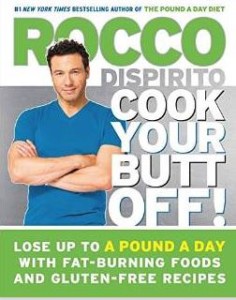 In the New York Times video chef DiSpirito explains that we shouldn’t use kitchen appliances and do cooking tasks by hand as a form of exercise to burn more calories (he claims this can burn up to 400 calories an hour – doubtful – unless you’re somehow running around or doing exercises at the same time). I’m all for saving energy, noise, and doing some things by hand, but this doesn’t make sense in terms of diet or nutrition advice. In fact, the reason most people don’t cook is because they don’t have enough time – so it would make more sense to encourage time-saving devices. Also, although health experts are unanimous in encouraging exercise for better health, when it comes to using exercise to burn calories that leads to weight loss there is some debate. It’s disappointing that the New York Times Health Section is promoting such a book.
In the New York Times video chef DiSpirito explains that we shouldn’t use kitchen appliances and do cooking tasks by hand as a form of exercise to burn more calories (he claims this can burn up to 400 calories an hour – doubtful – unless you’re somehow running around or doing exercises at the same time). I’m all for saving energy, noise, and doing some things by hand, but this doesn’t make sense in terms of diet or nutrition advice. In fact, the reason most people don’t cook is because they don’t have enough time – so it would make more sense to encourage time-saving devices. Also, although health experts are unanimous in encouraging exercise for better health, when it comes to using exercise to burn calories that leads to weight loss there is some debate. It’s disappointing that the New York Times Health Section is promoting such a book.
- Rocco’s dispiriting diet (Diana Chard, RD)
Detox or Cleansing Diets
-
Why cleanses are so popular, even though they don’t work (Timothy Caulfield, Business Insider)
- Unless you’re a heroin addict, you probably don’t need to detox. Here’s why. (Julia Beluz, Vox.com)
- Debunking Detox (Sense About Science)
- Cleansing – Not as Clean as You Thought! (Jill Parnell, No Baloney Blog)
- Detox cleanses may not live up to the hype (CBC)
- Thinking of Detoxing? Time to Think Again (Tim Crowe, Thinking Nutrition Blog)
- Forget detox diets – just boost your body’s natural defense/detox system with these tips (Rosie Schwartz, Enlightened Eater Blog)
- The Detox Myth: What your alternative health provider isn’t telling you (Science-Based Pharmacy Blog)
Herbalife
Dietitian Diana Chard provides a nice review of Herbalife, summing it up with ” Herbalife is a company with a dubious sales model, selling questionable products (I’m being generous here) that’s run by a doctor with a clear lack of integrity. If you want soy nuts, go to the Bulk Barn. Don’t waste your money supporting a despicable company like Herbalife.” (Diana Chard, Bite My Words)
Isagenix
Isagenix is an expensive meal replacement program involving shakes, bars, and herbal supplements that relies on multilevel marketing often via social media or email to promote its product. The product boasts “nutritional cleansing,” “detox” and is essentially a low-calorie diet that might promote short-term weight loss. Research has repeatedly shown that weight loss that relies on meal replacements and low calories is difficult to sustain, since it doesn’t change habits. Also, why spend a whole lot of money on low-calorie shakes and supplements when you can choose real foods that are inexpensive, fit into regular daily habits, and have proven nutritional benefits?
Reviews & More Information:
- Does Isagenix Help You Lose Weight, or Lose Your Money? (Fooducate)
- Isagenix under the microscope. (CHOICE online)
- Isagenix Study Is Not Convincing (Science-Based Medicine)
- Defending Isagenix: A Case Study in Flawed Thinking (Science-Based Medicine)
Shakeology
Nutrition Scam & Waste of Money. A look at the the nutrition in shakeology, a multi-level marketing scheme. (Fooducate)
Whole30
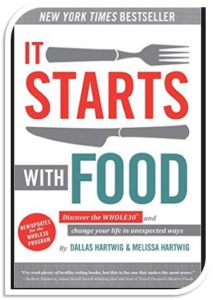 The Whole 30 diet is an “extreme” paleo diet that eliminates a wide variety of healthful foods, including all grains, legumes, dairy, and soy. Micheal Hull’s critical review linked to below details the lack of credibility of the authors and highlights the pseudoscience in the book.
The Whole 30 diet is an “extreme” paleo diet that eliminates a wide variety of healthful foods, including all grains, legumes, dairy, and soy. Micheal Hull’s critical review linked to below details the lack of credibility of the authors and highlights the pseudoscience in the book.
RD Abby Langer sums it up nicely in her review:
“Whole 30 isn’t a whole foods diet, it’s a half-wit cleanse that cuts out a ton of healthy food for no good reason. It uses poorly done research to ‘prove’ points and is written in an insulting, punitive way. The Whole 30 is a lesson in extremes: good vs bad. Toxic vs clean. Strong vs weak. Not many things in life are that black and white, and food is certainly not one of them.” – Abby Langer, RD.
- The Whole30 Diet Became My Dangerous Obsession (Ashley Abramson, Brit + Co)
- The Whole 30: A Lesson In Extremes (Abby Langer, RD)
- Whole 30 Critical Review (Michael Hull)
- The Whole 30: A Dietitian Review (Jen Rawson, RD)
_________
Updated July 26, 2018
Share This: